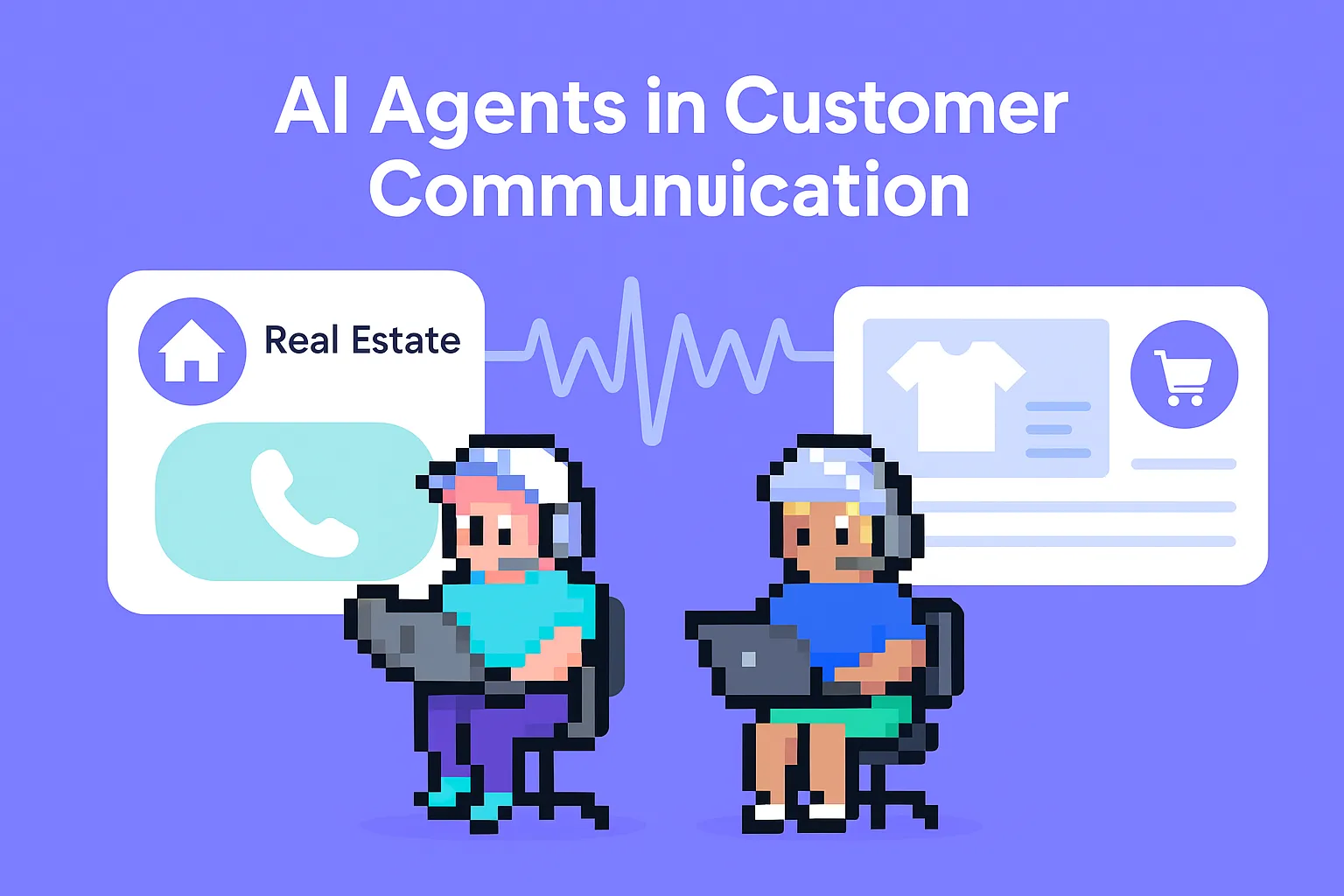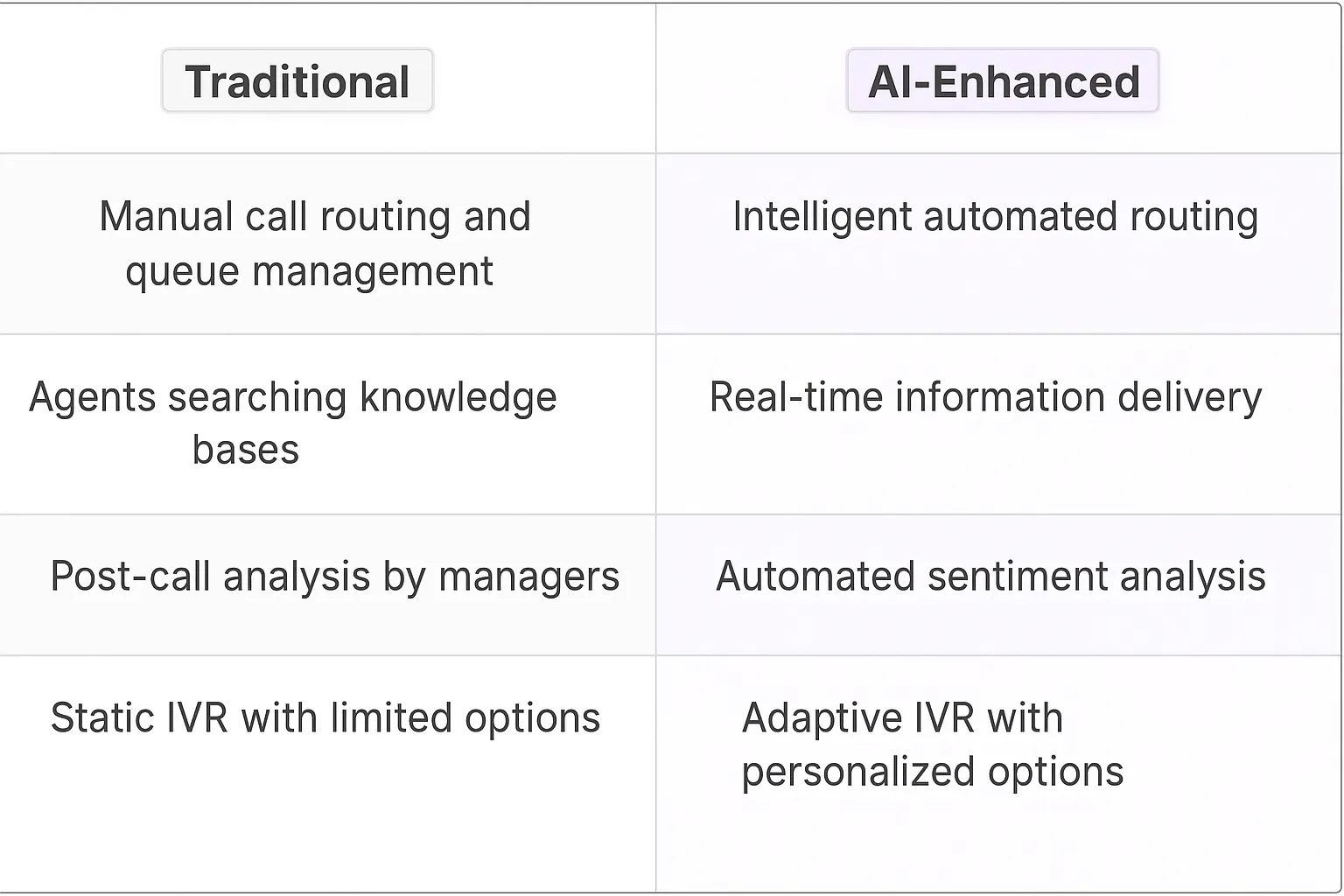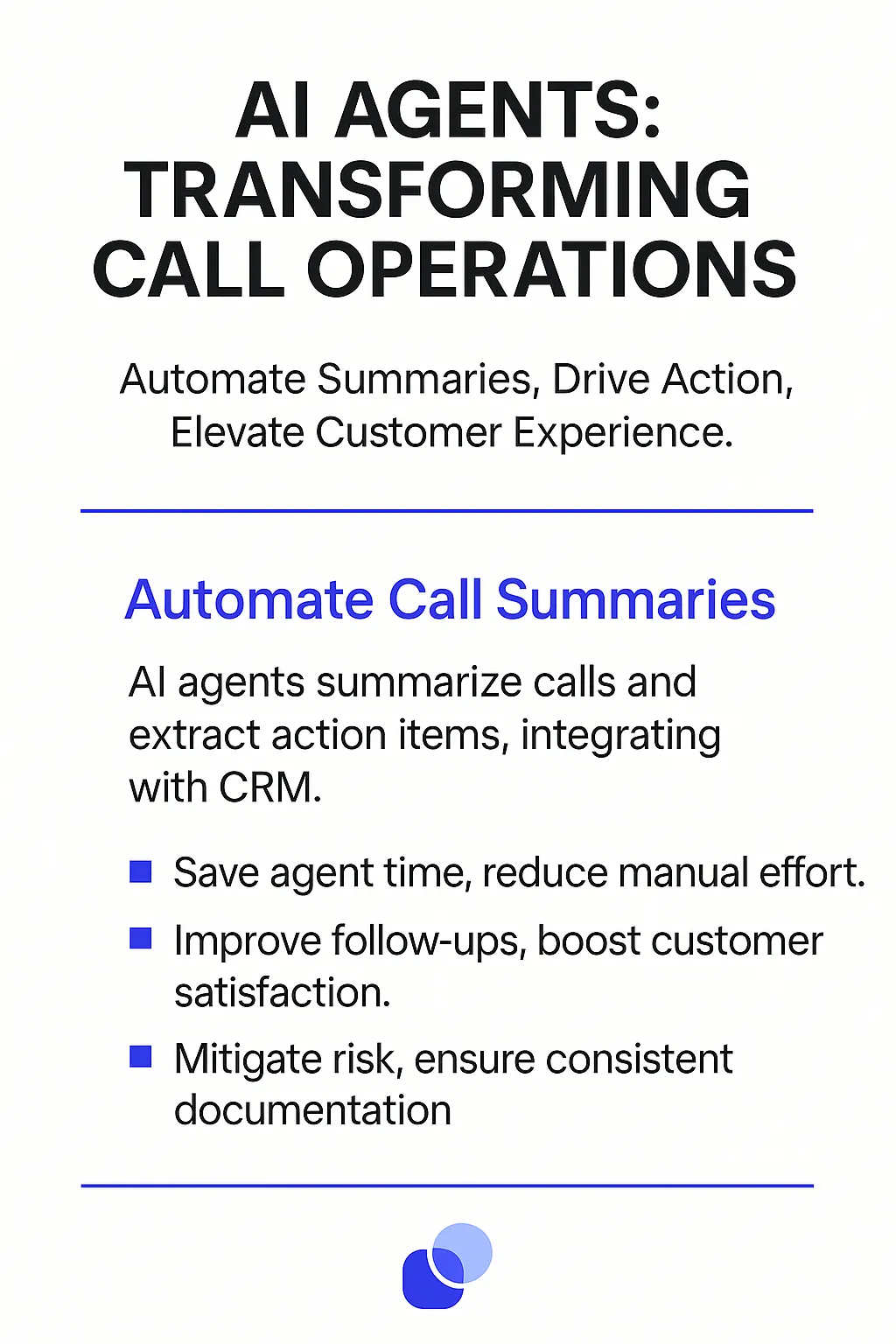Aircall AI Agents
Understanding Aircall
Aircall is a cloud-based phone system that's redefining how businesses handle customer communication. It's not just another VoIP service; it's a comprehensive platform that integrates seamlessly with CRM systems and other business tools. Aircall allows companies to set up virtual call centers, manage international numbers, and track performance metrics in real-time.
Aircall stands out with its user-friendly interface and powerful features. It offers call routing, IVR menus, and call queuing to streamline incoming calls. The platform's analytics dashboard provides deep insights into call patterns and team performance. One of Aircall's killer features is its extensive integration ecosystem, allowing it to play nice with tools like Salesforce, Zendesk, and Slack. But the real game-changer is Aircall's openness to AI integration, which is where things get interesting.

Benefits of AI Agents for Aircall
What would have been used before AI Agents?
Before AI agents entered the scene, Aircall users were stuck in a world of manual processes and inefficient workflows. Customer service reps had to juggle multiple tools, frantically searching knowledge bases while on calls. Managers spent hours poring over call logs, trying to extract meaningful insights. It was like trying to build a skyscraper with a hammer and nails – possible, but painfully slow and prone to errors.
The traditional Aircall experience relied heavily on human memory and intuition. Reps had to remember complex product details, pricing structures, and company policies. They'd often put customers on hold to consult with colleagues or dig through documentation. This led to longer call times, frustrated customers, and burned-out employees.
What are the benefits of AI Agents?
Enter AI agents – the game-changers that are redefining how we think about customer communication. These digital teammates are like having a team of expert assistants at your fingertips, ready to tackle any challenge that comes your way.
First off, AI agents are turbocharging call efficiency. They're constantly listening and analyzing conversations in real-time, pulling up relevant information before the rep even realizes they need it. It's like having a mind-reading sidekick that anticipates your every move.
But it's not just about speed – it's about quality. AI agents are learning from every interaction, identifying patterns and best practices. They're turning each call into a goldmine of insights, helping reps improve their skills and managers make data-driven decisions.
One of the most exciting benefits is the personalization factor. AI agents are creating tailored experiences for each customer, remembering preferences and past interactions. It's like every caller has their own dedicated account manager, even if it's their first time reaching out.
And let's talk about scalability. With AI agents, Aircall users can handle higher call volumes without sacrificing quality. It's like cloning your best customer service rep and giving them superhuman abilities.
The bottom line? AI agents are transforming Aircall from a simple phone system into a powerful, intelligent communication platform. They're not just tools – they're partners in growth, helping businesses build stronger customer relationships and drive real results.

Potential Use Cases of AI Agents with Aircall
Processes
AI agents are poised to transform how we handle calls and manage customer interactions through Aircall. These digital teammates can take on complex processes that traditionally required significant human intervention. For instance, they could:
- Automate call routing based on real-time analysis of customer intent and agent availability
- Conduct post-call analysis to identify trends, sentiment, and areas for improvement
- Generate comprehensive call summaries and action items, saving agents valuable time
- Optimize call center staffing by predicting call volumes and peak times
Tasks
On a more granular level, AI agents can handle specific tasks within the Aircall ecosystem, enhancing efficiency and customer experience. Some key tasks include:
- Real-time language translation for international calls
- Automated scheduling of follow-up calls based on conversation outcomes
- Intelligent IVR systems that adapt to customer preferences and history
- Proactive outreach to customers based on predictive analytics
The integration of AI agents into Aircall isn't just about automation—it's about augmenting human capabilities. These digital teammates can handle the heavy lifting of data processing and routine interactions, freeing up human agents to focus on high-value, complex customer engagements.
Consider a scenario where an AI agent monitors calls in real-time, providing agents with instant access to relevant customer information, product details, and suggested solutions. This symbiosis between human empathy and machine efficiency could redefine the standards of customer service.
Moreover, AI agents could revolutionize training and onboarding for new Aircall users. Imagine a system that learns from top-performing agents and creates personalized training modules for newcomers, continuously adapting based on individual progress and company-wide performance metrics.
The potential of AI agents in Aircall extends beyond the obvious. They could become pivotal in identifying upsell opportunities, predicting customer churn, and even contributing to product development by analyzing customer feedback at scale.
As we move forward, the key will be striking the right balance between AI capabilities and human touch. The goal isn't to replace human agents but to empower them with tools that elevate their performance and job satisfaction while delivering unprecedented value to customers.
The integration of AI agents into Aircall represents a shift from reactive to proactive customer service. It's not just about handling calls efficiently; it's about anticipating customer needs, personalizing interactions, and creating a seamless experience that blends the best of human intuition and artificial intelligence.

Industry Use Cases
The versatility of AI agents in Aircall makes them valuable across various industries. Let's dive into some meaty, industry-specific use cases that showcase how AI can transform workflows and processes. These aren't your run-of-the-mill examples – we're talking about real, tangible ways AI is reshaping how businesses operate through Aircall.
From retail to healthcare, finance to hospitality, AI agents are becoming the secret sauce that gives companies an edge. They're not just tools; they're digital teammates that learn, adapt, and continuously improve. As we explore these use cases, you'll see how AI is moving beyond simple automation to become a critical part of strategic decision-making and customer interaction.
What's particularly exciting is how these AI agents are breaking down traditional industry barriers. They're enabling cross-pollination of ideas and practices that were once siloed. So, buckle up – we're about to take a deep dive into how AI is rewriting the playbook for industry-specific communication and problem-solving through Aircall.
Transforming Real Estate with Aircall AI Agents
The real estate industry is ripe for disruption, and Aircall AI Agents are poised to be the game-changer. Let's dive into how these digital teammates can revolutionize property management and sales.
First off, consider the sheer volume of calls a typical real estate agency handles daily. From property inquiries to scheduling viewings, it's a never-ending stream of communication. Enter Aircall AI Agents. These smart digital teammates can handle initial inquiries, qualify leads, and even schedule appointments without human intervention.
But here's where it gets interesting: these aren't your run-of-the-mill chatbots. Aircall AI Agents can understand context, detect emotion, and adapt their communication style accordingly. Imagine a potential buyer calling about a beachfront property. The AI Agent doesn't just recite facts; it paints a vivid picture of the ocean view, describes the sound of waves, and even suggests nearby attractions - all while gauging the caller's interest level.
For property managers, these AI Agents are a godsend. They can handle tenant complaints 24/7, prioritize urgent maintenance requests, and even initiate the repair process by contacting pre-approved vendors. This level of automation not only improves tenant satisfaction but also frees up human agents to focus on high-value tasks like property acquisition and strategic planning.
The real kicker? The learning capability of these AI Agents. They continuously improve by analyzing successful interactions, adapting to regional dialects, and even picking up on industry-specific jargon. Over time, they become indistinguishable from top-performing human agents.
This isn't just about efficiency; it's about scaling personalization. In an industry where relationships are everything, Aircall AI Agents enable real estate firms to provide white-glove service to every client, regardless of the size of their portfolio.
The potential ripple effects are massive. As these AI Agents handle routine tasks, human agents can evolve into strategic advisors, focusing on complex negotiations and market analysis. This shift could redefine the role of real estate professionals, pushing the industry towards a more consultative model.
In essence, Aircall AI Agents aren't just tools; they're catalysts for a fundamental shift in how real estate business is conducted. And for forward-thinking firms willing to embrace this technology, the competitive advantage could be astronomical.
Elevating E-commerce Customer Service with Aircall AI Agents
E-commerce is eating the world, but customer service remains a massive pain point. Enter Aircall AI Agents - they're not just another chatbot, but a paradigm shift in how online retailers handle customer interactions.
Let's break it down. The average e-commerce store deals with thousands of customer queries daily. Returns, order tracking, product questions - it's a never-ending deluge. Most companies throw bodies at the problem, scaling their support teams linearly with growth. But that's a losing battle.
Aircall AI Agents flip this model on its head. They're not just handling FAQs; they're engaging in complex problem-solving. Imagine an AI that can access your entire product catalog, order history, and shipping data in milliseconds. It can tell a customer not just where their package is, but why it's delayed and proactively offer solutions.
But here's where it gets interesting: these AI Agents learn and adapt. They're constantly analyzing successful interactions, picking up on customer sentiment, and refining their responses. Over time, they become indistinguishable from your best human agents.
The implications are profound. Suddenly, you can offer 24/7 support without the overhead. You can handle Black Friday-level traffic every day of the year. But more importantly, you're collecting an unprecedented amount of customer interaction data.
This data becomes a goldmine for product development and marketing. You're not just solving problems; you're gaining real-time insights into customer preferences, pain points, and buying patterns. It's like having a focus group running 24/7.
For e-commerce startups, this is a game-changer. You can now compete with Amazon-level customer service from day one. For established players, it's a way to dramatically improve margins while enhancing the customer experience.
But let's take it a step further. These AI Agents aren't just reactive; they're proactive. They can reach out to customers post-purchase, gauge satisfaction, and even make personalized product recommendations. It's like having a sales team that never sleeps.
The end game? A complete reimagining of e-commerce customer relationships. We're moving from transactional interactions to ongoing conversations. It's not just about solving problems; it's about building lasting connections at scale.
Aircall AI Agents aren't just a tool; they're a strategic asset that could redefine competitive advantage in e-commerce. For founders and product leaders willing to embrace this shift, the potential upside is enormous. It's not just about cutting costs; it's about creating a moat through superior customer experience.
In the end, the e-commerce winners won't just be those with the best products or lowest prices. They'll be the ones who leverage AI to build the strongest, most responsive customer relationships. And Aircall AI Agents are paving the way for this future.
Considerations and Challenges in Implementing Aircall AI Agents
Integrating AI agents into Aircall's ecosystem isn't a walk in the park. It's more like navigating a complex maze while juggling flaming torches. Let's dive into the nitty-gritty of what you're up against.
Technical Hurdles
First off, you're dealing with a beast of a system. Aircall's infrastructure is intricate, and plugging in an AI agent is like performing open-heart surgery on a marathon runner mid-race. You need to ensure seamless integration without disrupting ongoing operations.
Data privacy is another thorny issue. You're handling sensitive customer information, and one slip-up could land you in hot water. Implementing robust encryption and anonymization protocols isn't just good practice—it's essential for survival in today's regulatory landscape.
Then there's the challenge of real-time processing. Your AI agent needs to keep up with the rapid-fire pace of customer interactions. Lag time is your enemy here. You need lightning-fast algorithms and a rock-solid infrastructure to handle the load.
Operational Speedbumps
On the operational front, you're looking at a significant shift in how your team works. Introducing AI agents is like adding a new species to an ecosystem—it changes everything. Your human agents need to learn to dance with their digital teammates, and that's no small feat.
Training is a massive undertaking. Your AI needs to understand the nuances of human communication, your company's voice, and the intricacies of your product or service. This isn't something you can achieve overnight—it's an ongoing process that requires constant refinement.
Measuring success is another puzzle. Traditional metrics might not cut it when you're dealing with AI-human hybrid interactions. You need to develop new KPIs that accurately reflect the value these digital teammates bring to the table.
Lastly, there's the human factor. Some of your team members might view AI agents as a threat to their jobs. Addressing these concerns head-on and fostering a culture of collaboration between humans and AI is crucial for successful implementation.
Change management becomes critical here. You need to guide your team through this transition, helping them understand that AI agents aren't replacements but enhancements to their capabilities.
Implementing Aircall AI agents is a complex endeavor, but the potential payoff is enormous. It's not about replacing humans—it's about augmenting their capabilities and creating a more efficient, effective customer service ecosystem. The road might be bumpy, but the destination is worth the journey.
The Future of Customer Communication: AI-Powered Revolution
The integration of AI agents into Aircall represents a seismic shift in customer communication. We're not just talking about incremental improvements; we're looking at a fundamental reimagining of how businesses interact with their customers. These AI agents are turning Aircall from a mere phone system into a strategic asset that can drive business growth.
But here's the kicker: we're still in the early innings of this AI revolution. As these digital teammates become more sophisticated, we'll likely see use cases we can't even imagine today. The companies that embrace this technology now will be the ones setting the standards for customer experience in the future.
The challenges in implementation are real, but they're not insurmountable. With careful planning and a willingness to iterate, businesses can harness the power of AI agents to create a competitive edge.













